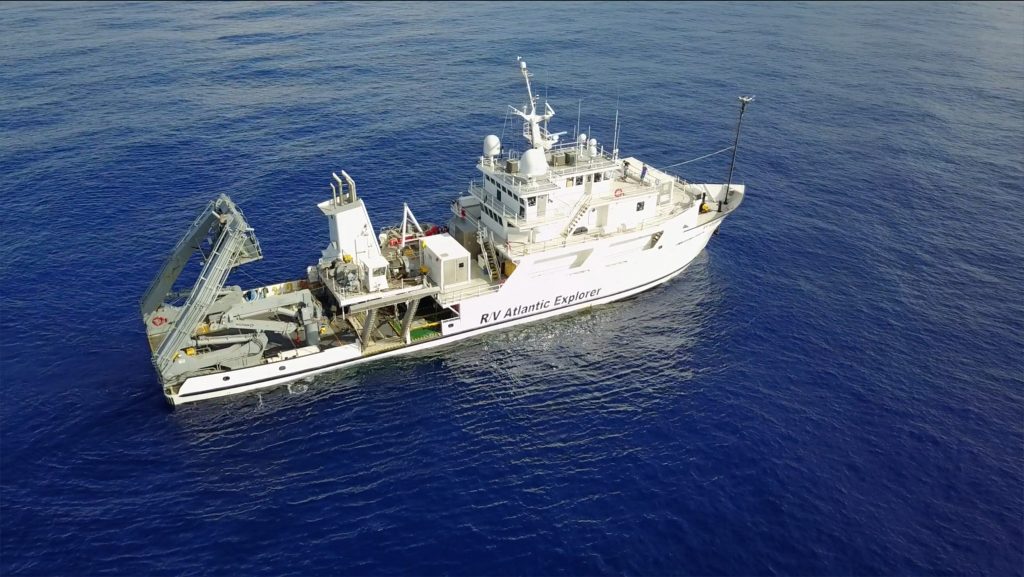As I write this post, I’m sitting in my office in Clark Laboratory at Woods Hole Oceanographic Institution. I’m not supposed to be here! I am supposed to be on the R/V Roger Revelle, dropping deep drifting floats in the Deep Western Boundary Current east of the Grand Banks of Newfoundland, and documenting our progress on the high seas via this blog. But the expedition hasn’t started-at least not yet. What happened!

R/V Atlantic Explorer. Credit: https://www.eurofleets.eu/vessel/rv-atlantic-explorer/
We were all ready to embark on this expedition from Woods Hole at the beginning of May. I was packing my seabag, and all the RAFOS floats and sound beacons for tracking the floats during their two-year underwater drift were just about ready to load onto the ship. But one week before our departure date, the Revelle had a major mechanical breakdown! Instead of taking us to the Grand Banks, the Revelle has had to go to a shipyard for repairs, and it will not be available for our expedition. Yikes!
This was a completely unexpected turn of events. Everyone planning to participate on the expedition, and those staying ashore who were going all out to help prepare the equipment, were initially stunned by the news that within one week of sailing, our expedition was indefinitely postponed.
We have been planning and preparing for this expedition for more than two years. In February 2023, we submitted a grant proposal to the National Science Foundation to carry out this exciting research. We learned that we were awarded the funds for the project six months later, and ever since, we have been working hard to prepare for the expedition–building and testing the floats and the sound beacons. We already had waited a full year for a research vessel to be available—there aren’t many of them and they are booked months and years ahead. . And now the expedition we had prepared so hard for and eagerly anticipated was called off!
Disappointed as we all were, we jumped right into working with the government agency that schedules the U.S. research fleet—called the University-National Oceanographic Laboratory System (UNOLS)—to figure out when our expedition could be rescheduled. In the first few days, the outlook was bleak—none of the larger research vessels had any openings until next year! We would have to store all our equipment away for a whole year, and try to get it into the water in 2026. That felt so deflating after being pumped up for our expedition to happen now.
But then the schedulers noticed that a mid-sized vessel operated by the Bermuda Institute of Ocean Sciences, R/V Atlantic Explorer, had some flexibility in their schedule, and it turns out they are available to help us with at least half of the expedition work. They have enough time for us to set up the sound beacon network for tracking the RAFOS floats. We are very fortunate in that half of the RAFOS floats were already scheduled to be launched by helpful colleagues from Germany and France in late summer, just after the sound tracking network is set up by R/V Atlantic Explorer. We will need to continue to work with the vessel schedulers to identify another expedition for launching the other half of the floats later in 2025 or in 2026. But at least we have this fantastic back-up plan to get much of our equipment into the ocean this year, only a couple months later than we had planned. Hooray for R/V Atlantic Explorer!
This story illustrates one of the realities of scientific research: it doesn’t always go according to plan—especially research at sea. It is an enormous challenge to get far out on the ocean and probe its depths and discover how deep currents are pushing water around. The distances are vast, ships are relatively slow (about 10 mph), the weather can be uncooperative, and equipment and vessels sometimes break down. Oceanographers have to be persistent, flexible, and creative in solving each challenge that comes up. But the rewards—discovering a new feature of Earth’s climate system—is worth it.